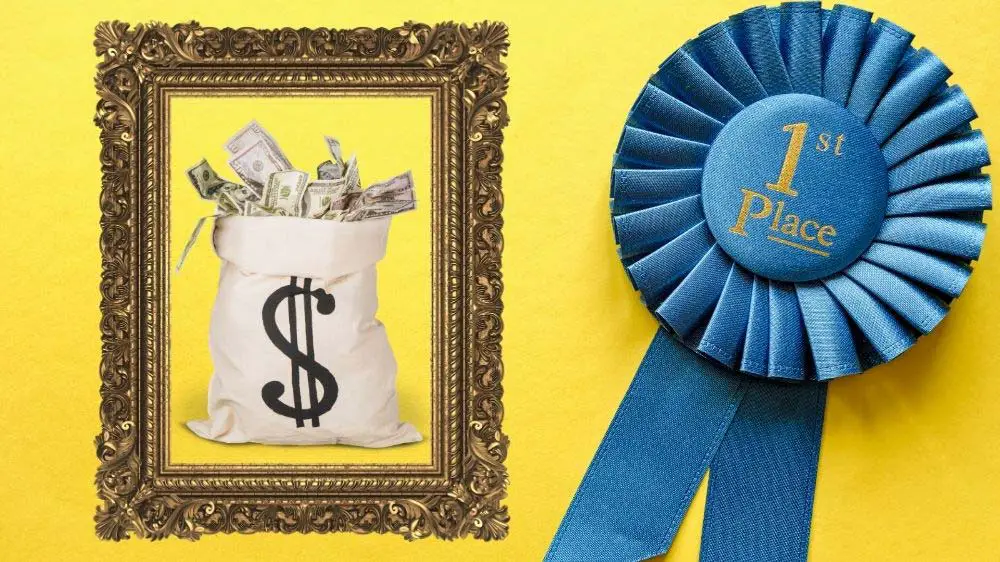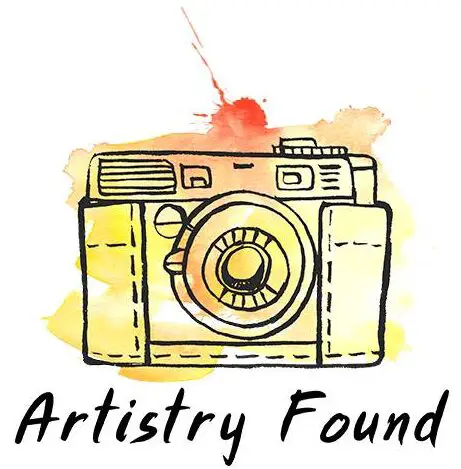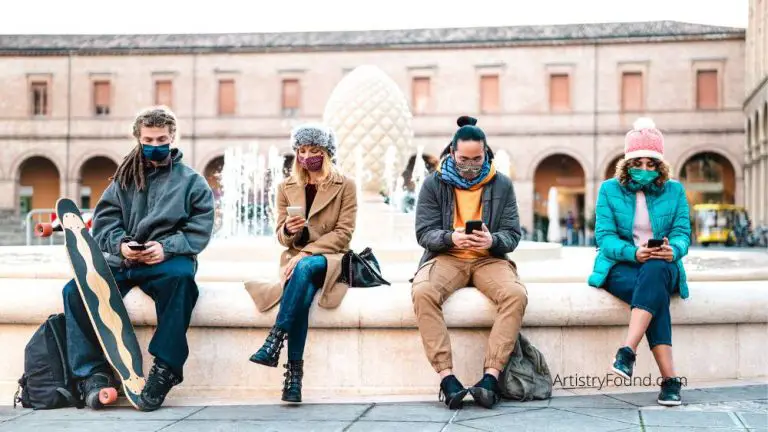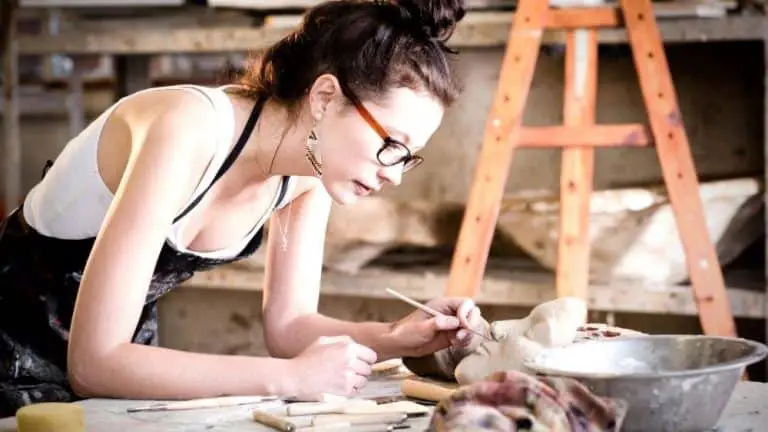Don’t Do It! 12 Reasons Art Contests Are Evil
Art contests are a great way for emerging artists to get their work noticed by the public, or at least they would be if the entire system wasn’t pure evil hell-bent on sucking every ounce of creativity and confidence out of your soul!
If you’re strongly considering spending your hard-earned money and time on an art contest, we have 12 reasons why you should save those resources for better things and refrain from entering any art contest at all costs. Trust us, it’s not worth it. Here’s why art contests are bad:
In general, art contest are bad for artists because they stifle creativity and help create a toxic environment whereby an artist tries to gain validation by conforming to the rules of the contest. Furthermore, art contests are often just a money making venture for the organizer, who has no real interest in the art.
Read on to find out the 12 specific reasons art contest are a waste of time!

(This article may contain affiliate links and I may earn a commission if you make a purchase)
Art Contests Stifle Artistic Development
Many art contests will have some form of criteria the submitted works must meet to be seriously considered for acceptance into the competition, let alone as the winner. One of the most common criteria is a contest theme or subject the submission has to revolve around.
While some artists see this as a challenge to push them out of their comfort zone, they don’t realize how pointless or even detrimental this can be to the overall development of their unique style.
It’s certainly beneficial to be explorative with your art, but you should do this on your terms, not for the benefit of some art contest.
The majority of art contest participants are up-and-coming artists who haven’t explored their interests and honed a distinct style, and so, they focus more on making art they think will win the competition than what is uniquely theirs.
As they continue to enter and participate in contests, their style becomes more a reflection of their contest submissions than one created from self-reflection and personal exploration.
If your goal is to make impactful art that anyone could recognize as yours from a glance, you’ll want to steer clear of art contests and their themes that threaten to derail you from a focused personal style.
Inherently Undermines the Ideology of Art
The overall concept of art contests is counter-intuitive to the most basic art ideology as a form of open expression through a medium.
Not only do the art contests often tell what you should be creating through themes and subjects as previously discussed, but it also puts a time constraint on your submission. Placing a deadline is disadvantageous to creativity and often causes new artists to underperform because they are more focused on finishing the piece in time rather than doing it to the best of their abilities.
There’s a lot of trial and error when it comes to art. Even the greatest artists will scrap a piece and start over if they feel it isn’t aligning with their artistic vision.
Unfortunately, if you envision a brilliant new concept for your fine art contest submission, but the deadline is in a few days, you’re probably going to finish what you already started rather than pursuing this new piece that might have turned out exponentially better.
Another issue with art contests is that they are ultimately centered around winning. To the participants, only a fraction of their motivation is about the actual art.
Instead, they are typically more focused on what they can gain from the contests, such as recognition, exposure, and maybe some money if they’re lucky.
Although these factors can certainly be beneficial, particularly to new artists, we feel that it grievously detracts from what the contests should be about, the art.
Art Contests Aren’t Meant for Artists
It might be a hard pill to swallow, but get some water because the cold, hard truth is that art contests aren’t made to benefit the participants. In reality, they’re a paycheck for the organizers.
Too many starry-eyed newbie artists fall into the trap that is art contests thinking this is a great investment for their career when in reality, it’s just a way for you to place your money in the pockets of the organizers through non-refundable contest entry fees.
A decent number of art contests will have entry fees around $30-$50 but only supply the winner with a cash prize from $1,000-$4,000. Now, some of you might be thinking four grand looks like a pretty decent sum, which in all respects, it is, until you realize how much money the organization pockets comparatively.
Let’s say you enter an art contest for $30 and submit one of the finest pieces you’ve ever created. But, what’s this? You can also pay another $20 to submit an additional piece. You figure you have the time and motivation, so why not go for it? Your odds are better with two submissions than one anyway, right?
So now you’ve spent $50 on a non-refundable entry fee, but it looks like 6,000 other artists did the same thing for the same contest. The number adds up pretty quickly for the organization, doesn’t it?
Now consider that of those 6,000 artists that each submitted two pieces of art, the show only has room to display 1,000 works. That means that out of 12,000 entered works of art, the organizer has taken in a whopping $300,000, and only a mere fraction of the artworks are ever put on display.
Suddenly the $4,000 grand prize doesn’t seem as achievable or nearly as appealing as what the organization just made on entry fees.
Of course, we recognize that some of this entry fee money goes to paying for the prizes and the studio space for the actual event, but you can’t fool us into thinking the majority of it goes here. The art contest organizer has just made a pretty penny off the backs of the artists.
Art contest organizers will accept as many submissions as possible, and they have absolutely no obligations to anyone but themselves.
With thousands of submissions and some pretty firm deadlines, it makes you wonder how they even have the time to sufficiently judge all these pieces to crown a winner. But we’ll get more into that later.
Art Contests Crush Artists Far Too Often
There’s no doubt that the art industry is incredibly saturated and competitive, so it is extremely difficult for anyone to navigate this industry to make a solid living off of being a professional artist regardless of skill. This is why many will choose art contests as their first steppingstone.
However, whether you’re entering an art contest to support a full-time career or a personal passion, many outside sources vehemently agree that this is a quick path to killing your confidence as an artist.
It is far too easy for someone to enter an art contest and put a significant amount of their self-worth and merit as an artist into the judge’s opinions.
You have to remember that only around 1,000 submissions out of hundreds of thousands will be accepted for every art show, and of those 1,000 placed in the public art exhibition, only one will win.
The odds of winning are astronomical, so there is absolutely no shame in your work not receiving first place and this by no means reflects upon your artistic skills.
Unfortunately, many artists will become extremely discouraged and lose their artistic motivation when they don’t win. This might happen after the first contest they enter or the twentieth.
All we can tell you is that the emotional turmoil isn’t worth it. Art contests will consistently tempt you to try again and enter the next competition, but resist the urge. They’re not asking you to resubmit because they think your artwork will win; they want your entry fee money.
You’re better off finding an alternative path that is more constructive and doesn’t involve a third party that is more interested in profit than your artistry.
Creates a Toxic Environment Within the Art Community
There are many activities that are competitive by nature, like sports or video games, but art shouldn’t fall under this category. The fact that art contests force this competitive atmosphere on something highly subjective has a toxic effect on the art community.
Art competitions induce an “all or nothing” mentality into participants, so they already feel like a lot is on the line before the judging even starts. Unfortunately, this leads to a great deal of jealousy and resentment when an artist realizes a competitor made it farther in the competition than them.
The fact that one work of art made it further in an art contest doesn’t mean the piece is inherently better. It could simply be a matter of the artwork following the competition’s guidelines more closely, or it just happened to resonate with a particular art juror or judge more than the other.
Rather than question the judges’ expertise and motivation, artists will turn on themselves or their competitor’s work. Instead of reminding themselves that art is entirely subjective, they’ll dissect their work and compare it to competitors to discern why they failed to make it as far in the competition.
This mentality could potentially follow them throughout their career where they constantly compare their art to others rather than focusing on their work independently and how it makes them feel.
Art Contests Aren’t Credible Source of Artistic Validation
When you’re an up-and-coming artist with limited experience and no real source of validation for your work, art contests will seem like the perfect place to start.
Many of these competitions are run by prominent and well-established organizations and receive thousands of submissions a year. Therefore, it’s easy to think that if you can at least get accepted into these contests, then your artwork must have some merit.
Although it is certainly no easy feat to get your work chosen for display in an art contest, let alone win, these competitions aren’t the definitive force for determining your artistic skills.
In reality, all that happens in art competitions are a series of judges will provide their biased opinions on a vast number of pieces, and you have to hope that they take a liking to yours for one reason or other.
The only true source of validation in artwork comes from consumers. No one is going to care how many blue ribbons you won during an art contest they’ve never heard about. They’ll know you’re a good artist when they look at your work, and it resonates with them so much they’re willing to buy it.
And at the end of the day, that’s the goal of being an artist apart from pursuing your passions. You want the pieces you create to impact others profoundly and then be able to make a living off of inciting this reaction so deeply and frequently that you can consistently sell your art.
All the art competition will do is maybe put your artwork on display where a handful of potential customers might see it, and sometimes, you can’t even get this far.
Some Art Contests Are Complete Scams
If you’re going to enter an art contest, please do your research ahead of time. The number of illegitimate contests out there hosted by scammers would surprise you.
Some artists are so eager for exposure, prize money, and all the other opportunities art contests offer that they forget to make sure it’s even a genuine competition.
Or worse, the contest is legit in the sense that a reputable organization creates it, but it’s filled with loopholes and hidden fees they know applicants won’t read. To us, they’re just as bad as the frauds.
Our best piece of advice to spare your money and time is to avoid art contests completely, but if you’re still set on sending your work to as many contests as possible, make sure you follow these tips.
Validate the Host Organization
The easiest way to discern a scam art contest from a legitimate one is to determine if the host organization is real and reputable.
Searching for a company website is a great start, but these days with modern technology, it’s become extremely for someone to whip up a decent-looking website with a generator and some templates.
Take your investigation one step further by checking if this organization is referenced elsewhere in the art world. Social media is a fantastic place to start since most successful companies have at least one account on Facebook or Twitter. If this organization doesn’t, it’s an immediate red flag.
You can also check their website for references to artists, curators, or other art professionals and contact the ones listed to see if they’ve actually worked with the organization or if there were simply a name drop on a fake website.
Verify the Contest Claims
Numerous contests make some grandiose claim to entice applicants to send in their money and participate. If you’re unsure about a particular contest’s authenticity, follow up on the claims it makes to see if everything checks out.
For instance, if the contest says they’ll show the top 1,000 works in a particular studio, gallery, or venue, call that location to confirm this.
Another common art contest prize is giving the first place some award or a magazine feature of their accomplishment. You can easily contact some sort of customer service number or email and ask these companies if they are aware of this deal or particular contest before you enter.
Do They Mention the Judges?
Art contests always have judges, and typically, if a legitimate organization hosts the contest, these judges have quite the reputation in the art world.
These judges add to the whole façade that art contests are places where knowledgeable and esteemed individuals will judge the best works and put their artists on the track to a prosperous career. If the judges aren’t respected and well-known, anyone could theoretically judge the competition, and the whole contest would lose credibility.
So judges play a huge role in these events, and if a contest doesn’t at least list them, it’s probably a scam. If it does list the judge’s names, start your research. Look into who they are, what they’ve achieved, and how well-known they are in the community.
If your research says they’re a real person that could be a genuine judge, go one step further and try to find some contact information to confirm they are indeed going to judge this event.
Art Contest Organizers Are Crafty Manipulators
Arguably the true source of art contest’s evil is the sinister and manipulative nature of their organizations.
We’ve already discussed how art contests are essentially a money grab for host organizations, but we haven’t yet touched upon the point that these individuals keep art contests going by consistently preying on participant’s desires for validation, lack of experience and self-confidence, and their failure to find their niche consumer base.
If every artist were infallibly confident in their work and had a steady source of income from a loyal consumer base, they’d have absolutely no need for art contests. And organizers know this.
The whole concept of art contests is ludicrous. Somehow, these organizations convince people to pay them money to judge something artists put their hearts and souls into and maybe let others see it. The artists do all the hard-word and pay for it.
But people do it, and they do it in the thousands! The reason is that these organizations know exactly what buttons to push to play on all your insecurities and entice you to enter. They’ll use lines like “we provide new opportunities for artists around the world” or wave award eligibility for finalists in participant’s faces.
These are meant to convince artists that entering this art contest is the first step to public recognition, legitimacy, opportunities that will fast-track their career. In reality:
- The prize money is small compared to what the organizers really make
- The odds of being accepted, displayed, and winning are slim
- The awards mean nothing to consumers
- Many opportunities come with strings attached, like magazines that require you to buy advertising space
If you want people to see your artwork, you’re better off posting it on social media where it’s free, thousands of people can see and appreciate it, and you aren’t throwing away money that art organizations just pocket.
Art Contests are a Waste of Time and Resources
This point can’t be stressed enough, and it goes beyond just the entry fee most artists toss away to participate in art contests.
Arts contests want participants to pay their entrance fee and be grateful for the opportunity for their art to be considered and judged by professionals with the chance of public exposure. Unfortunately, they do much more than taking your money; they take your time, mental sanity and use up precious resources.
An artist that decides to enter and compete in an art contest isn’t just going to submit a cute drawing they whipped up in ten minutes. They’re going to give it their absolute best shot because they believe the organizations’ manipulative promises that this is good for their career.
This might lead them to:
- Buying new art materials and supplies
- Buying a frame for the piece
- Pushing off other artistic endeavors
- Spending countless hours working tirelessly towards perfection
- Paying for entry fees, printing, and shipping
Instead of investing their valuable time and resources into creating art that people will actually see and maybe even buy, participants waste it all on a piece that the judges might approve of but is more likely doomed for denial like thousands of others.
We’re not saying this with the implication that their art is poor; it’s just the reality of the situation that countless skilled artists are denied from competitions on entirely subjective grounds.
Sadly, once you’ve wasted all that time and energy on a competition piece, you won’t get it back, and very little of it pays off. In fact, more often than not, participation in art contests has a negative return.
You’re better off saving and investing this precious time, effort, and resources elsewhere, but if you’re truly passionate about entering art contests, we strongly recommend you calculate the net worth of your efforts and ensure that at least the prize money will cover this.
You Might Be at a Disadvantage Before You Even Enter
Art contests will accept an endless supply of submissions until the entry deadline arrives (many art contest will then even “extend the deadline” to encourage additional last minute submissions), and then they will determine which submissions are chosen for display.
If you read that a contest allows 1,000 works to be shown in a particular studio for the competition, you’d assume that those 1,000 come from the countless submissions they received from paying participants. But, you’d be wrong.
Some art contests will set aside a select number of accepted works for those previously curated by networking artists that have already gained a degree of favoritism from organization members.
These artists might have personal connections to the judges; they could have a reputation in the area or have been a finalist or winner for the same competition in past years. For whatever reason, they’re remembered and already have a leg-up, particularly in the first phase of accepting submissions.
These individuals take spots from everyday participants and already significantly decrease their chances of success. Not only does the everyday artist have to jump through the hoop of biased artistic opinions from the judges, but they also have to worry about if the judges are even impartial, to begin with.
In our opinion, the odds are already stacked so high against you in art competitions; you don’t need this rigged cherry on top. Spare your money and your pride and toss that entry application in the trash.
The Process and Wait Period Can Have Serious Emotional Consequences

To make a long point short: art contests aren’t fun. They’re incredibly stressful and emotionally damaging.
First, you have to create a killer piece that aligns with all of their entry requirements, which is its own emotional roller coaster of creativity in itself. Then, you add the time constraint to the equation, so you need to make sure everything is picture-perfect before the application date passes.
Then you have to get all your materials professionally prepared, paid for, and shipped off as you sit at home biting your nails for weeks or even months waiting for that acceptance or denial letter. The whole time you’re questioning your application. Maybe you should’ve drawn it this way or chosen that color palette or left the other section the way it was, etc., etc.
It’s the perfect opportunity to wallow in your stress, anxiety, and self-doubt as you hope for illegitimate validation from a group of money-grabbing, biased art snobs. Fun, right?!
And it doesn’t just stop at the waiting process. Once that beautiful letter arrives, you can either enjoy the demoralizing and depressing devastation of a rejection letter that threatens to ruin any confidence you had in yourself as an artist, OR you get the lucky fate of being accepted and repeating the process of anxiety and stress-ridden waiting until a champion is chosen. Double fun!
For a bonus, if the organization has somehow convinced you that this whole process is worth a retry (because according to them, you were “so close” last time), you get to relive the emotional trauma all over again, and you even get to pay them for the experience. Thanks, art contests!
You’re Subjecting Yourself to Biased Judgement
Let’s get one thing straight, Vincent Van Gogh could be judging this competition with Picasso on his left and da Vinci on his right, and they still wouldn’t have the authority to tell you if you’re worthy of being an artist. Their opinion might have a degree of weight from their accomplishments, but that’s about it.
The same goes for any judge in any art contest. Sure, some people are more educated on the technical principles of art, such as:
- Balance
- Contrast
- Movement
- Pattern
- Space
These elements are often key to impactful art, but there is absolutely no rule book on how they should be applied or if they need to be applied at all. How does one judge good art vs bad art, when art is entirely subjective? When you enter an art contest, you subject yourself to the judges’ incredibly biased opinions and place far too much credit on them.
Honestly, the three artistic giants we just mentioned could look at a piece and have completely different opinions on its impact and artistic merit. In fact, considering how much each of their artistic styles differs from one another, we’d bet some serious money on this theory.
The point we’re trying to express is that even the greatest artists in the world don’t have the right to tell you whether your art belongs in a public studio, on someone’s wall, or even taped to your fridge.
If you enjoy creating art and you’re proud of what you make, keep at it. Someone down the line is sure to share your passion, and to support what you do. And once they do, you can start finding others just like them. Before you know it, you’ve grown a solid clientele ready to purchase anything you make.






